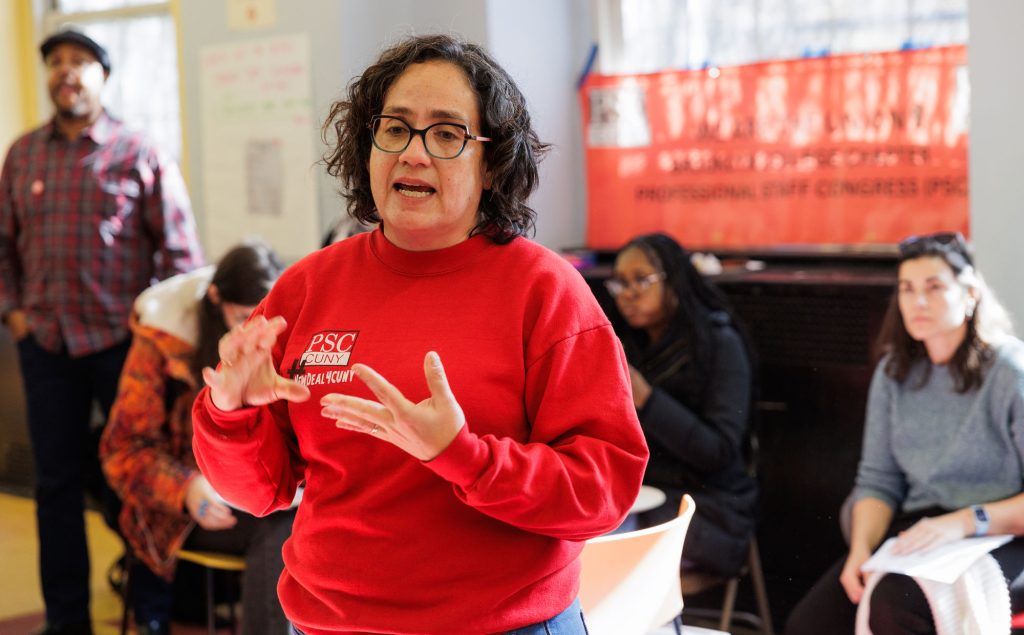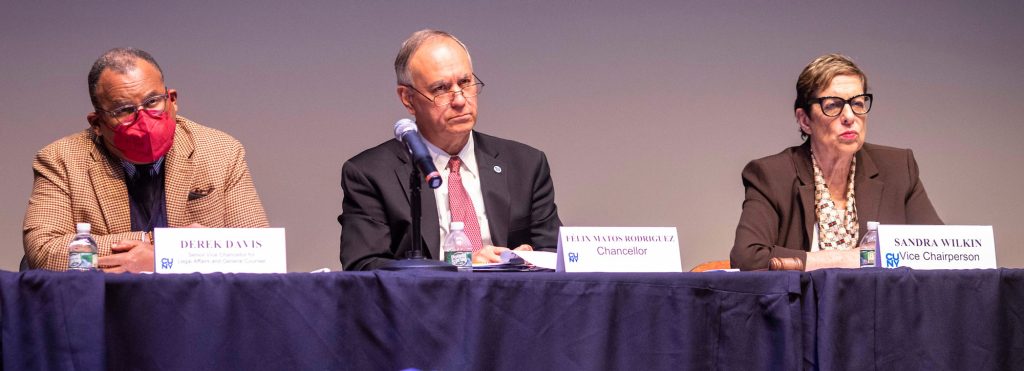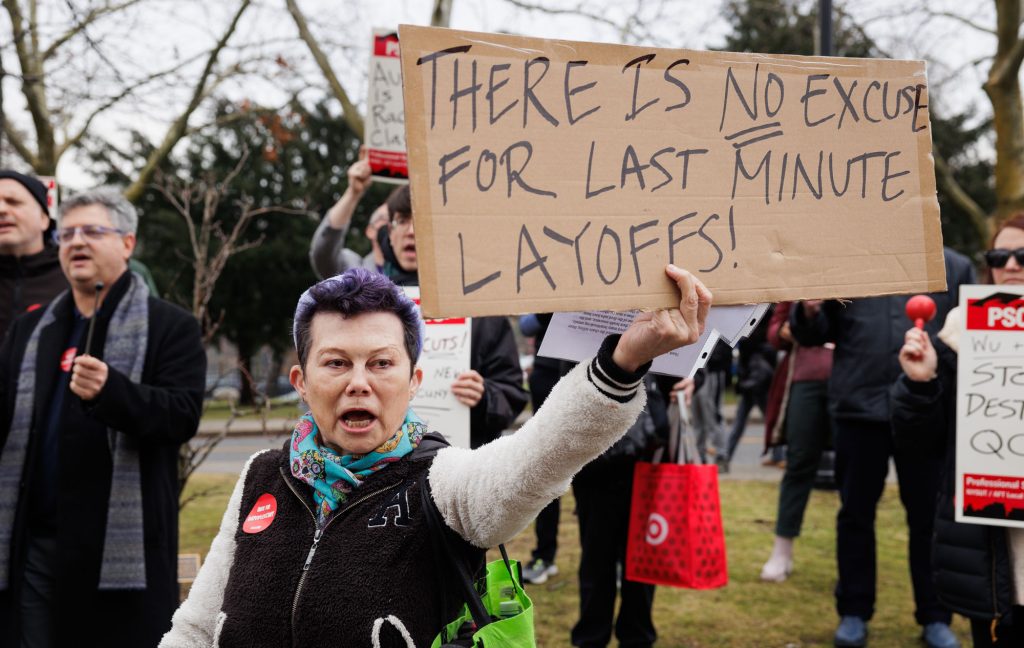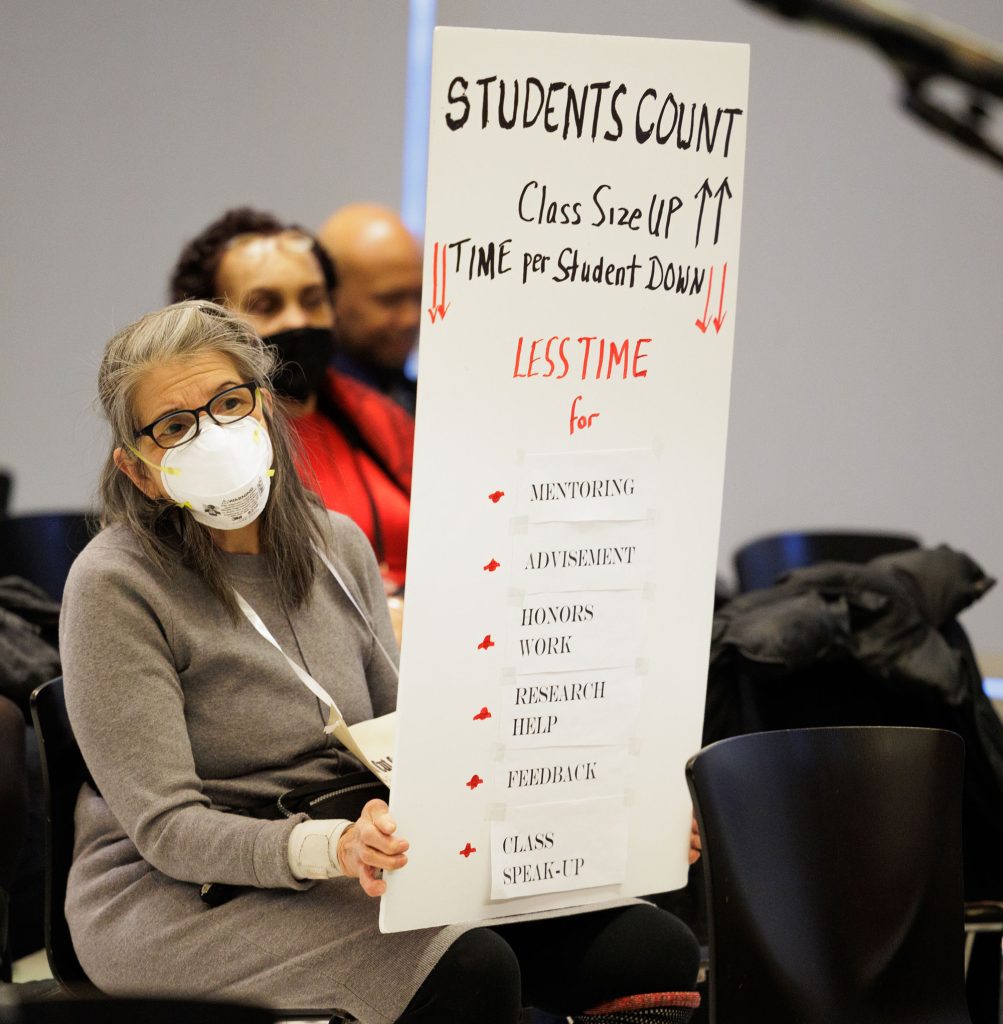
Carolina Bank Muñoz, PSC Brooklyn College chapter chair, says these cuts are ‘unconscionable.’ Photo credit: Paul Frangipane
More than 50 Queens College faculty and staff members were gathered outside their campus’s administration building, as their president, Frank Wu, looked on. The PSC members were protesting the severe new budget cuts at Queens, resulting in the layoffs of more than two dozen full-time instructors. David Gerwin, a former PSC chapter chair at Queens College, handed Wu a list of all of the departments impacted by the cuts. Wu left the scene in the middle of the rally. “That’s a real classy move,” said Kevin Birth, an associate professor of anthropology, with his trademark sarcasm.
Birth and his fellow members are part of a broader University-wide movement fighting CUNY’s irresponsible and draconian responses to fiscal challenges. Before the start of the new semester, PSC members protested new cuts to nine campuses, mandated by the CUNY Central administration. While many of these campuses are already dealing with understaffing and worsening physical conditions, the new cuts mean class cancellations, layoffs and an overall erosion of education.
ADMINISTRATION’S RATIONAL
In addition to rallies around the city, numerous state and city elected officials joined with CUNY faculty, staff and students at Borough of Manhattan Community College (BMCC) to denounce the cuts. “This is going to have a material impact on their lives,” said Assembly Member Zohran Mamdani, speaking of what the cuts would do to working-class students.

Chancellor Félix V. Matos Rodríguez (center). Photo credit: Dave Sanders
The campuses under the knife are BMCC, Kingsborough Community College, the School of Professional Studies, Queens College, York College, John Jay, the College of Staten Island, Brooklyn College and City Tech.
In a CUNY Central administration document obtained by Clarion, the administration explains the rationale for cuts by saying, “The rapid and unprecedented enrollment loss fueled by the pandemic has been the primary driver of structural deficits at campuses across the University,” adding that “from fiscal year 2020 to 2022, the University lost $140 million in tuition revenue.”
And in a letter from Chancellor Félix Matos Rodríguez to the Queens College (QC) PSC chapter, he wrote, “Nine CUNY colleges have been identified as having acute fiscal challenges and therefore needing to take additional measures to be able to balance their budgets. Five of the nine colleges, including QC, are projected to have a cash deficit at the end of fiscal year 2024.”
He added, “The University’s deficit reduction plan is part of a nearly five-year multifaceted plan to stabilize the University’s finances and sustain our ability to fulfill our mission.”
On top of that, the University said, CUNY has suffered from cuts in city funding and underinvestment from the state, two problems the PSC is currently fighting. A memo from CUNY Executive Vice Chancellor and University Provost Wendy Hensel to all presidents and deans said that campuses should “move to an average enrolled section size of 25 students and raise fill rates to 85%.”
Thus, many students will have their classes cancelled. Many workers are losing their jobs – they will lose pay and direly needed health coverage. The city’s colleges are being cut to the bone. And union members around the city have demonstrated and told the press that the university administration is making terrible mistakes with these kinds of cuts.
ABRUPT DECISIONS

David Gerwin (left), of QC, hands QC President Frank Wu (right) a list of all the departments affected by the cuts. Photo credit: Paul Frangipane
At Queens College, 26 substitute faculty members were laid off for the spring semester. PSC chair Karen Weingarten told the Queens Ledger, “[For] these faculty members, it’s too late to find new classes.” She added, “They lose their jobs, they lose their health insurance and chairs are left scrambling to find a way to either staff or run many, many sections. There are hundreds and hundreds of students in these classes that the faculty members are teaching and now won’t be able to teach.”
The paper also quoted Amy Herzog, chair of the media studies department, saying the terminations were abrupt and caught the faculty off guard. “[The administration] left us, the chairs, the job of calling them to let them know they’ve been let go two weeks before classes begin, without ever having been consulted about other ways we could have saved money,” she said.
Gerwin, the chair of the college’s education department, told The City, “Nobody would dream of laying people off 10 days before the semester starts,” adding, “In my 20 years, there haven’t been these last-minute notices.”
This comes as the college has already hollowed itself out, according to members. In a Facebook post, the PSC Queens College chapter posted that the campus is still without a registrar, director of counseling services, director of graduate admissions and key faculty posts.
Gerwin later said that this kind of devastating austerity “lies squarely at the feet of Chancellor Félix Matos Rodríguez and CUNY Board Chair Bill Thompson.”
IMPACTING ENROLLMENT
Members at Queens College pointed out that the cuts will only make existing problems on their campus worse. Students are leaving the campus in frustration because of the lack of advisors and other service providers, in addition to class cancellations and the lack of college laboratory technicians to staff science courses. “It’s like they want an enrollment death spiral,” Birth said.

PSC members at Queens College protest the drastic budget cuts at CUNY campuses. Photo credit: Paul Frangipane
At Brooklyn College, the cuts this year come on top of a massive decline in morale, as the PSC chapter voted “no confidence” in the leadership of President Michelle Anderson, joining more than a dozen student clubs who have called for her resignation.
Carolina Bank Muñoz, the PSC chapter chair at Brooklyn College, said, “In March 2023, the college was asked to develop a plan to generate $9.3 million in ‘savings’ to reduce the ‘structural deficit’ as a result of a tuition shortfall in fiscal 2023, and in early December 2023 the college was asked to cut an additional $3.5 million in fiscal 2024 and $4.5 million in fiscal 2025. These cuts are unconscionable.”
Muñoz noted that these new cuts have only worsened the mood on campus. “We have no food vendor in the cafeteria, classrooms and offices are perpetually too hot or too cold, mold is a persistent issue in some of our buildings and the library is operating with reduced staff and hours,” she said. “As of October 2023, there were 77, mostly staff, positions that had been approved by the campus Vacancy Review Board (VRB), but had not been approved by President Michelle Anderson. The vast majority of the requests came from offices and departments seeking to replace personnel, rather than new positions. Importantly, most of these requests were for replacing personnel in key areas including infrastructure, student-facing offices and academic departments.”
She added, “This means that staff titles, represented by the PSC as well as other unions on campus, are faced with severe speed-up. Over the last year, staff have expressed deep concern over working out of title, working over their 35-hour work week with little or no additional compensation, and otherwise picking up the slack caused by attrition.” The college’s response to our consistent effort to raise these issues at labor-management meetings is to say that supervisors need to be trained in ‘prioritizing work’ and that staff need to work on ‘time management.’ But we all know that the work does not magically disappear. Management expresses shock and care for overworked staff and yet continues to ask them to do more with less.”

Members protest at a CUNY Board of Trustees hearing at John Jay College. Photo credit: Paul Frangipane
ACROSS THE UNIVERSITY
Members around the University have held protests against the cuts at the nine so-called “colleges of concern.” Members also demonstrated and testified during a CUNY Board of Trustees hearing at John Jay College, where they displayed signs decrying cancelled classes and reductions. Members around the city also held Valentine’s Day actions on their campuses protesting the cuts. And faculty and staff from the impacted schools met with state and city legislators and staff to explain the intensity and brutality of CUNY’s austerity plan. On top of all that, many members have submitted op-ed articles to the press and spoken to reporters about the crisis at CUNY.
DIRE EFFECTS
Gerald Markowitz, a distinguished professor of interdisciplinary studies and history at John Jay College, which is facing cuts, wrote in an op-ed for AM New York, “In my 53 years at John Jay College and at CUNY I have seen several periods of budgetary challenges. I have also seen that disinvestment does not make sense as a short- or long-term solution. Our students surmount serious obstacles to succeed. For future generations and for even greater societal benefits, let’s make it easier, not harder, for our amazing students to thrive.”
Scott Cally, the PSC chapter chair at Kingsborough Community College, said, “The latest round of budget cuts at Kingsborough couldn’t come at a worse time. At Kingsborough our enrollment has begun to recover after years of decline, and this so-called savings plan threatens to reverse the progress we have made. Following round after round of budget cuts, our professional staff are already at a critically low level.”
He added, “We are now seeing offices unstaffed, as we further decrease our staffing level, while at the same time faculty are facing pressure to raise class sizes. All of this is having the cumulative effect of degrading the services and educational quality we provide to our students, who are already among the most underprepared and underserved in New York City.”
But perhaps no campus has a more dire situation than York College, where a whopping proposed $11.5 million cut poses a severe existential crisis at the Queens campus. “At York, 275 class sections – or about 18% of all of its original total of 1,513 classes – have been cut from the registrar,” The City reported. Fabiola Salek – the chair of the world languages, literature and humanities department, believes it is far worse, telling Clarion that the administration wants all classes with less than 80% enrollment chopped. As a department chair, she said she tried to do “minimal damage” and cut as few classes as possible, but fears that the administration will ultimately cancel more classes despite her efforts.
“I’ve been very dismayed at the whole thing,” Salek said. “Either I do the cuts with a scalpel, or they do the cuts for me with a chain saw.”
Many faculty and staff members who are far from retirement are pondering if the end of their campus is near. “It’s very bleak,” Salek said. “People are very disturbed about the whole thing. It seems like a doom scenario.”
The campus, located in the Jamaica neighborhood, serves a largely Black community, and already suffers from infrastructural decay – it lacks an on-campus dining facility and PSC members there often complain about rodents and mold. “The library is falling apart. There are leaks everywhere,” Salek said.
‘NO CONFIDENCE’
In fact, in January, the faculty caucus of the York College Senate passed a “no confidence” vote against the senior leadership of the college for having “failed to cultivate shared governance and faculty involvement,” “undermined the shared governance of the [college] through a top-down decision-making process” and a “deficit crisis” that has “gone unchecked.”
“This school has been horribly mismanaged,” said Freya Pritchard, a professor of mathematics and computer science who is also the PSC chapter chair at York.
About 30 faculty and staff members held a protest in January at one of York’s main buildings to protest the cuts. While the rally lifted spirits, the mood at the school is still tense. Pritchard worries that if the cuts are not rescinded, the school could undergo “reorganization” or even end up being closed.
“The cuts are disastrous,” she said.
Published: February 27, 2024

